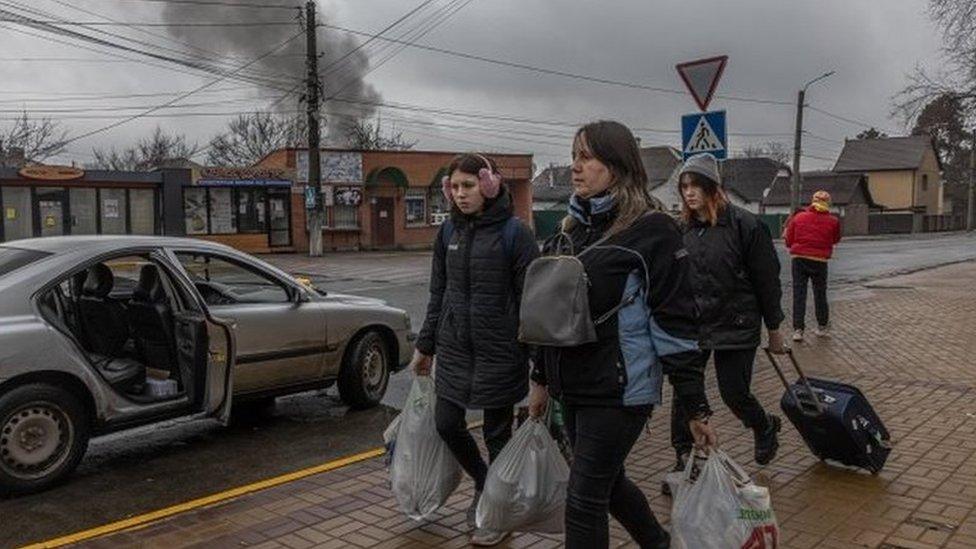Ukraine war has put the brakes on efforts to remove Boris Johnson - for now
- Published
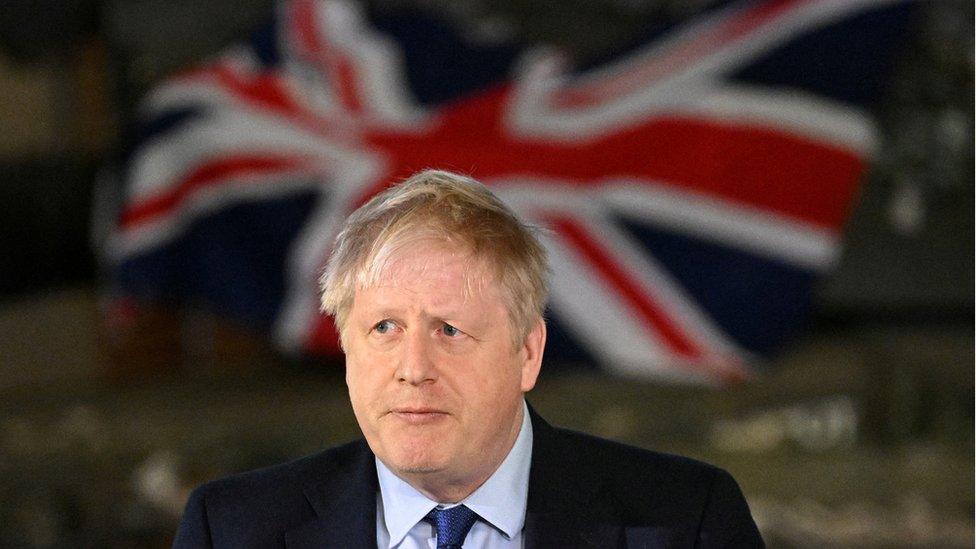
After fighting for his political survival last month, Boris Johnson is now spending time talking to a president at war
In the last 10 days so much has changed. Europe's security has been shaken. Western leadership seems to have found an energy, a way of coming together that has been lacking in recent years. Night after night, the world watches as the Ukrainian people spoil and slow down Vladimir Putin's plans of drawing new lines on the map.
Politicians here fret about how to help as much as humanly possible without crossing their own lines of putting their own servicemen and women into harm's way.
They worry too about how the public will cope with changes that are on the way here too - changes that aren't dangerous, but will be difficult, ratcheting up pressure on prices and energy bills with no straightforward solutions around.
An international crisis on this scale of course has consequences for our politics too.
The prime minister - now spending his time on calls with the president of Ukraine, jetting to eastern Europe and trying to broker Western action - was not so long ago trying to keep his own political head above water.
Headlines about birthday cakes, police questionnaires, lockdown rules and cheese and wine have gone, and the agony abroad has totally changed the political environment for Boris Johnson.
Most overtly the opposition has paused its repeated calls for him to quit.
On Sunday morning, asked if he still believed that Mr Johnson should go, Labour leader Sir Keir Starmer said: "Look, at the moment the prime minister is obviously concentrating on the job in hand and we stand united as the United Kingdom on that issue."
The party claimed later they were not technically withdrawing their demand for him to go, but without doubt, this crisis has fundamentally changed the opposition and the government's priorities.
February's frenzy seems a lifetime ago. The international crisis occupies the centre of government's time and most of Westminster's attention.
The PM had, even before the invasion, moved to reboot his team after weeks of chaos. One Tory insider describes the changes as going from "Operation Vote Leave, Operation Carrie, to Operation Staple Gun and Super Glue", as staff were sacked and others brought in to do everything to keep him in Number 10.
Now his focus, and that of Parliament and much of the public, is on Ukraine. The fury and anxiety about the parties in Downing Street and concern about Boris Johnson's handling of the saga is on hold - for now at least.
Whatever their view of Boris Johnson, for the vast majority of Tories it is just not the time for a conversation about changing the leader.
Reinventing himself
One minister says that anyone making public pronouncements about his leadership now would be "off their rocker". This stalwart defender says it has provided a "distraction and a recalibration of thinking" for those who wanted him gone.
Some Tory MPs - and remember they are the ones who hold the power here - go further, seeing opportunity too in this crisis for Boris Johnson. That's not to suggest for a second that the government's priority is anything other than trying to improve this truly grave situation.
One former minister says the Ukraine crisis "massively strengthens him", while another minister says that "it is events that set the mood", remarking: "We've all seen campaigner Boris."
And some believe the prime minister is more comfortable as a politician in this kind of intense environment. "It's his metier," one suggests, talking about a battle of international ideas rather than looking at spreadsheets or complicated domestic policy.
In other words, appalling though this situation is, there's a belief that it could allow Mr Johnson to reinvent himself after a terribly stormy few months in office, where the consensus was spreading quickly in his party that he was the problem and not the solution to anything.
Indeed, some feel more confident now about him being the person in charge. One cabinet minister, deeply worried about what's going, on told me: "I'm not nervous because of him, I'm nervous because of the situation. I was nervous during the pandemic about what he would do."
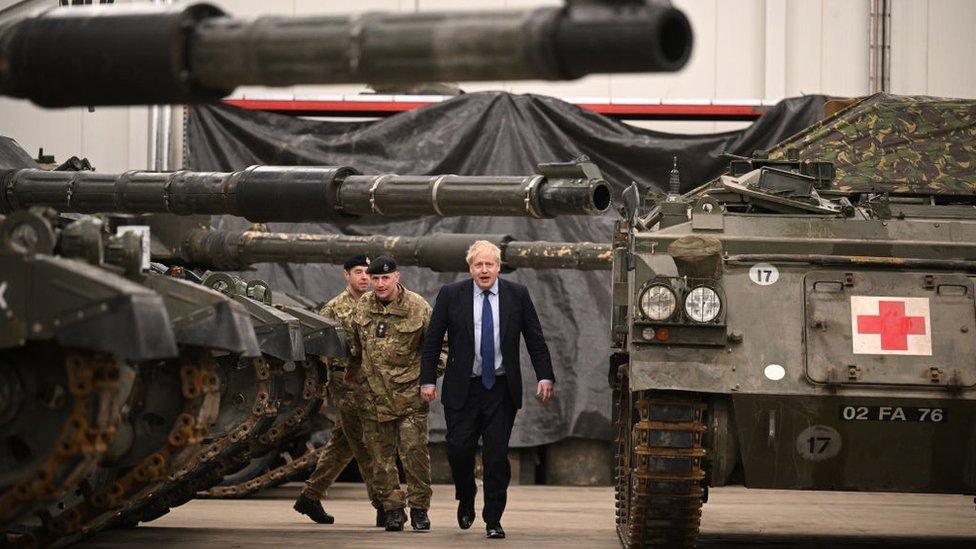
Some of his more excitable MPs appear to have told Sunday newspapers this could be his "Falklands moment" - a reference to the war in 1982 that galvanised support for Margaret Thatcher, whose government had been struggling, paving the way for another election victory the following year.
The parallels are far from exact and the comparison will rankle. But the political climate is transformed for now.
Even one of the prime minister's spikiest critics, the former Tory minister Rory Stewart, said through gritted teeth: "I think he's a terrible human being. I think he's a terrible prime minister but I think he's done OK on the Ukraine crisis."
But while the brakes are truly on efforts to move Boris Johnson out of his job, the past can't be totally erased.
One of those who was part of the disparate efforts to ease him out over the furore about Downing Street parties told me: "We can't just put this in a box for six months - if you say it's just about a piece of cake that's one thing, but if you frame it as about breaking the law you made and lying to Parliament it's quite another."
It's not clear yet when the Met Police will conclude their inquiries, or when Sue Gray will publish her full report.
Sources suggest they're on their way before Easter, but some of people due to be contacted by the police - the total is understood to be more than 80 - are yet to receive their questionnaires asking about their behaviour.
'Brand still damaged'
The timing of when those investigations conclude and emerge into the public domain will matter enormously. When the headlines are full of Ukraine's agonies, the saga over parties seems trivial.
Yet the police conclusions and Sue Gray's complete report still have the capacity to cause huge problems for Boris Johnson once again. One minister cautions that "a deep disconnect has opened up between him and the public", warning, if he is fined: "What would you put on a leaflet if you are Labour?".
The urgency has gone from the questions about his survival but there are obstacles he has to navigate still. That minister says: "His personal brand still is damaged".
The polls are still tricky for Conservatives. Like all politicians they may profess never to look at them, but they all do. Many Tory MPs look at the numbers and see discomfort not reassurance there.
Hard numbers in the last few days meant the Labour Party held its seat in the Birmingham Erdington by-election too.
It would be extraordinary if the Tories had grabbed that seat, which became vacant after the death of the hugely respected Labour MP Jack Dromey.
But Labour also increased its vote share over the Tories, who had hoped to hold their 2019 level but slipped back.
For a mid-term government, after the turmoil of recent months and calls for the prime minister to quit, it is far from a disastrous result.
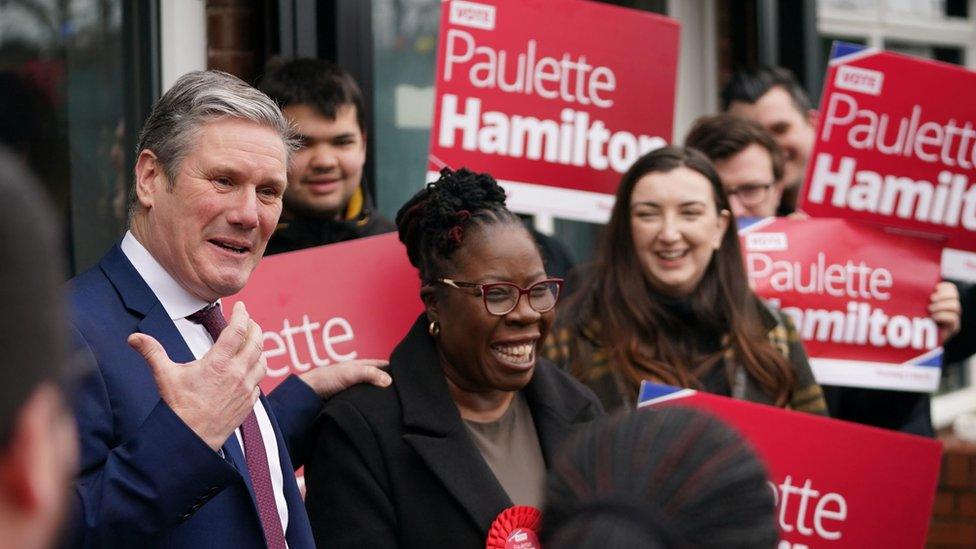
After the Birmingham Erdington by-election, local elections in May will provide the next test of Mr Johnson's popularity
By-election results should be treated with care, they are a hint of what might come not a solid path.
But translate the drop in support in Erdington into a hypothetical national result and the impact would be profound. Elections in May will provide another big test, and for Mr Johnson's critics a possible occasion to galvanise the attempt to oust him.
And few at Westminster believe what lies ahead will be any easier for the government. Inflation, tax rises, and conflict in Europe provide an extremely difficult political landscape. The uncertainty around what happens next gives some of Boris Johnson's colleagues cause for profound concern.
Several ministers have told me privately they believe that ultimately the might of the Russian military machine will overwhelm Ukraine.
What seems like a united Western front may go from looking powerful in rhetoric, the initial response to Russian aggression, but may in time come to look powerless if the outcome goes terribly, terribly wrong.
Some in government worry about the public reaction if international outrage - from the PM's push to exclude Russia from the banking system, to BP offloading billions of pounds of Russian assets, to pub owners taking Russian vodka off the shelves - ends in a prolonged conflict with terrible loss of life that we all witness night after night on our phones and TV screens.
The primary fear is what a cornered Vladimir Putin might do. There is a sense that nothing makes sense, nothing can be predicted, because he follows no logic that standard politicians would apply.
But there is also a fear about how to manage public opinion and expectation at home as things develop.
And the government's handling of the situation is not free from criticism either.
Concerns are gone, not forgotten
Ministers emphasise how the UK pushed harder and faster for action to isolate Russia, whether from international finance, or the banking system, or providing crucial military support.
But among the opposition and some Tory MPs too there is frustration at the speed of sanctions being applied to individuals.
And there's embarrassment over the Conservative party's links to wealthy people of Russian origins, doubts resurfacing about the elevation of Evgeny Lebedev to the House of Lords.
There are questions too about whether the UK is extending enough of a welcome to Ukrainians fleeing from danger. The home secretary has even been accused of showing a lack of humanity by her French opposite number.
We've gone in a very short time from a Westminster saga that outraged swathes of the public, drove the Conservatives round the twist and threatened Boris Johnson's job, to a government seized with the gravity of an international crisis with a leader determined to play a leading role.
But the latter doesn't make the former disappear. Concerns about Boris Johnson's leadership in his own party are gone for now, but are not forgotten. As one minister said: "Everyone's thinking it but no want wants to articulate it right now."
Related topics
- Published6 March 2022
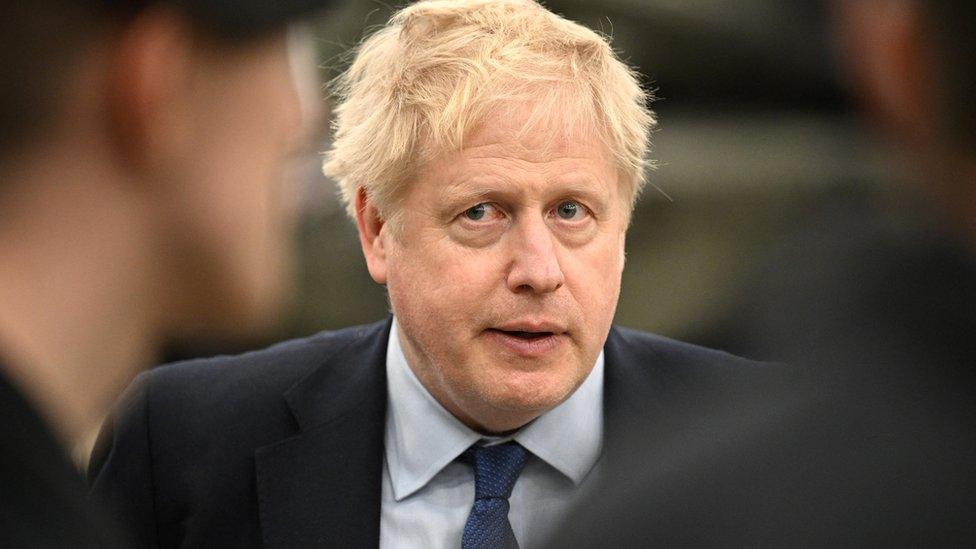
- Published6 March 2022
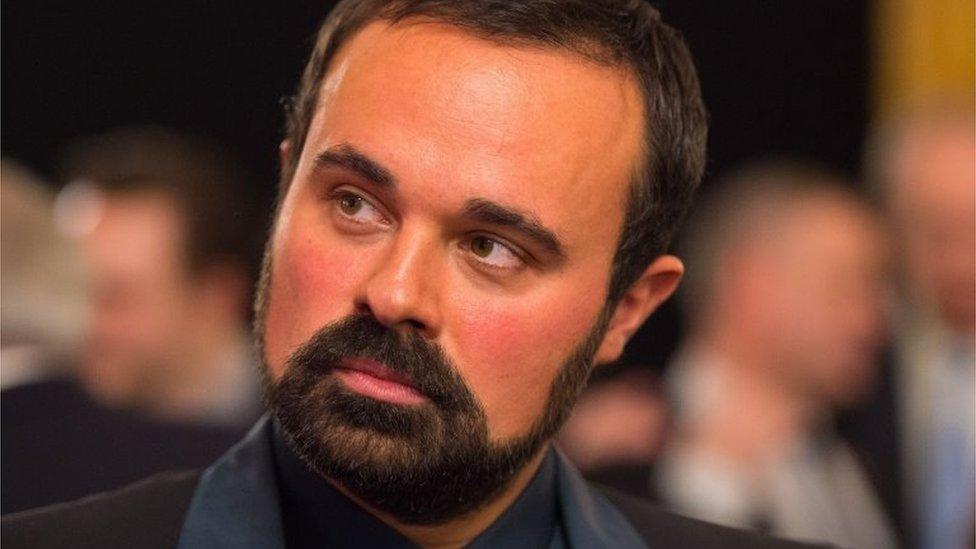
- Published3 March 2022
